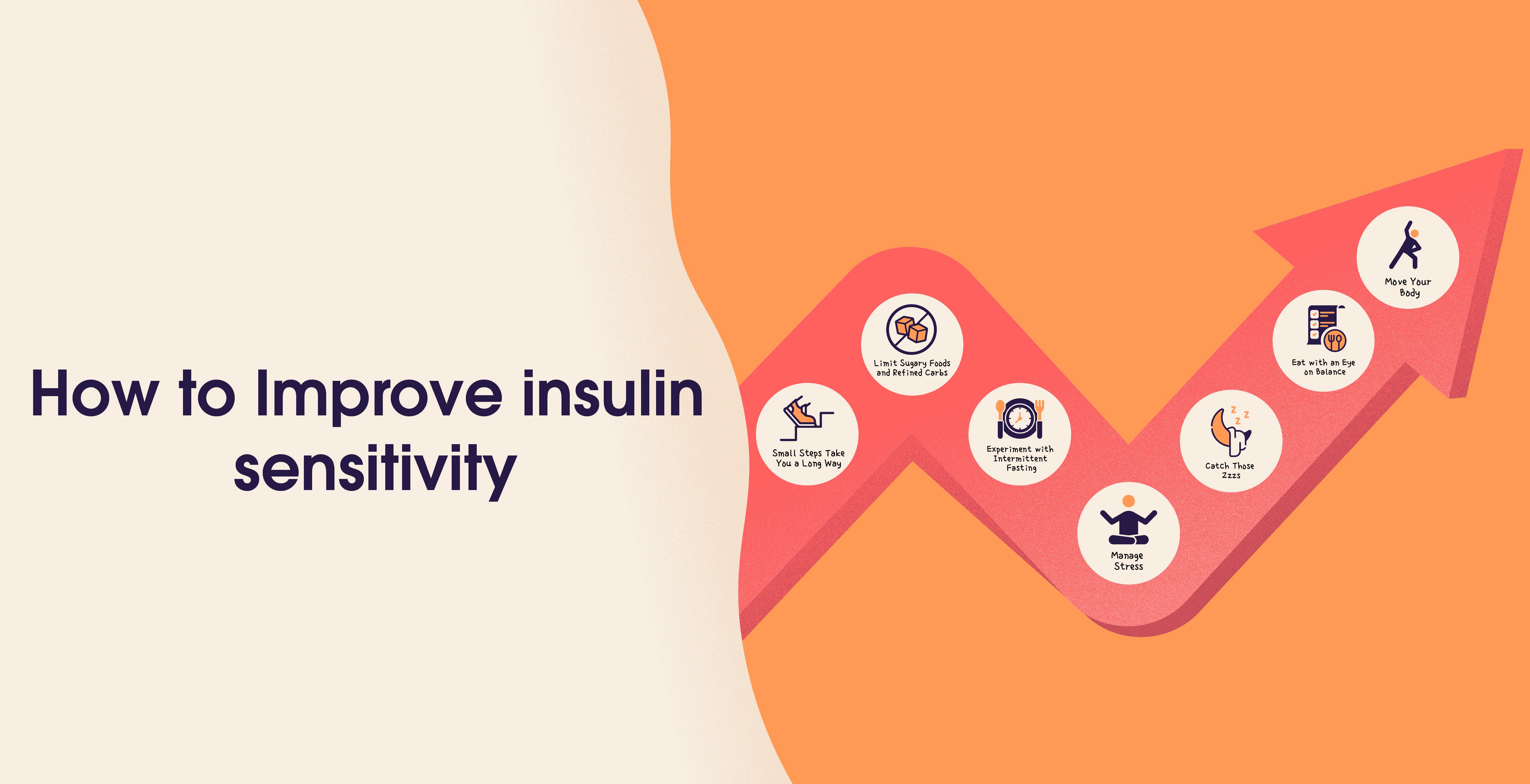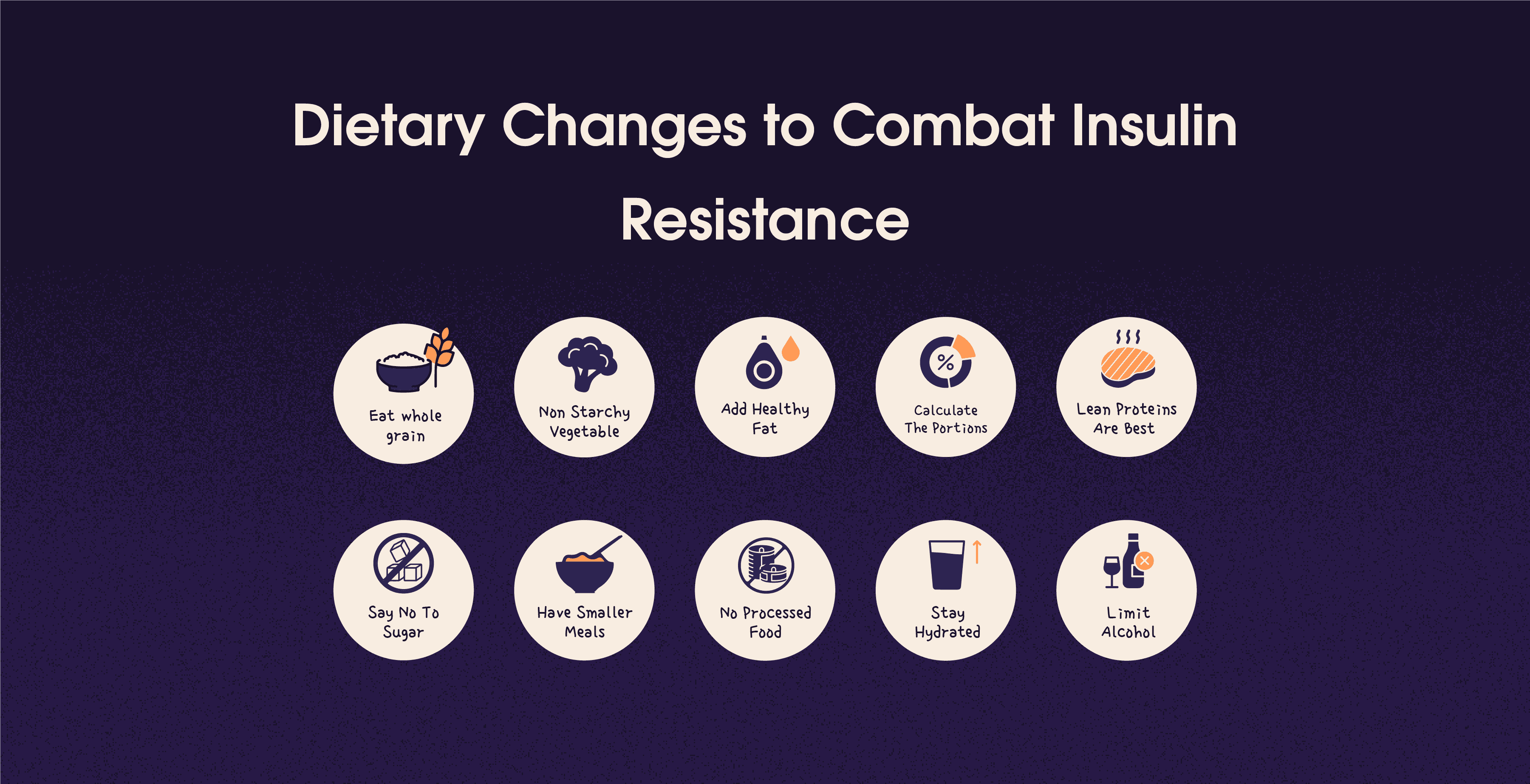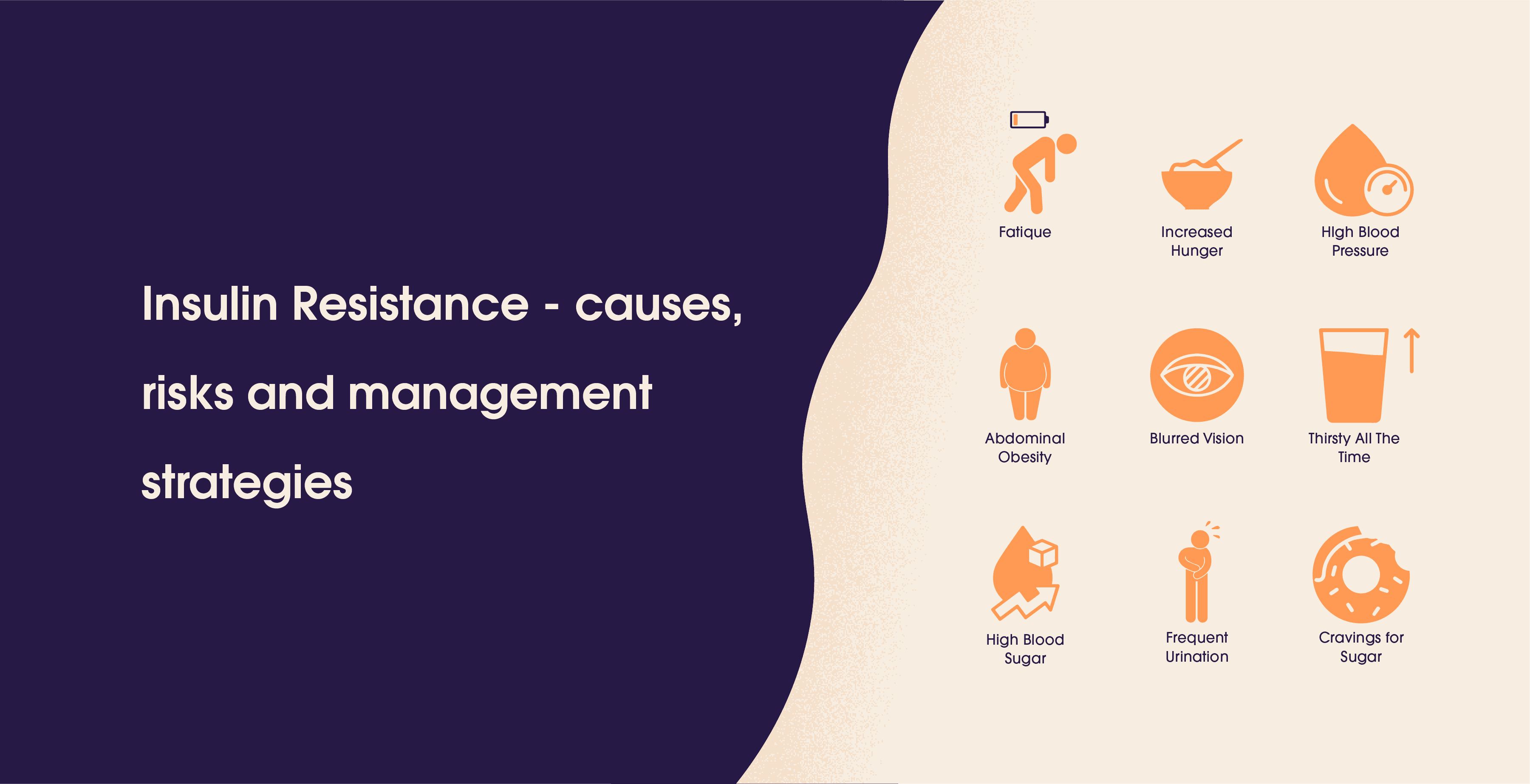How to Improve insulin sensitivity
Nov 6, 2024
Sayfali Rawlani



Table Of Contents
Improving insulin sensitivity is about finding that sweet spot where your body responds effectively to insulin, keeping blood sugar levels in check. Insulin, as you may know, is a hormone that helps cells absorb glucose, fueling everything from a casual walk to deep sleep. But when the body’s cells become a bit “insensitive” to insulin, more insulin is needed to get the job done, leading to higher blood sugar and, eventually, conditions like type 2 diabetes.
In the U.S., about 40% of young adults are estimated to have some degree of insulin resistance, and millions more are at risk without even knowing it. But the best part is insulin sensitivity isn’t set in stone. Small, consistent changes in lifestyle can make a world of difference.
Highlights
Physical activity, especially strength training and high-intensity exercises, significantly boosts insulin sensitivity, helping muscles absorb glucose more effectively.
Eating high-fiber foods like whole grains, legumes, and leafy greens can stabilize blood sugar levels. Foods rich in omega-3s (like salmon) and spices such as cinnamon and turmeric may also improve insulin response.
Chronic stress increases cortisol, which can contribute to insulin resistance. Techniques like yoga, meditation, and deep breathing help lower stress hormones.
Poor sleep disrupts hormonal balance, which can worsen insulin sensitivity. Establishing a routine with limited screen time can improve sleep quality.
Choose low-glycemic carbs and spread their intake throughout the day rather than consuming them all at once.
Intimate Fasting can improve insulin sensitivity by allowing insulin levels to drop and reset, though it may not be suitable for everyone.
Foods like olive oil, nuts, and seeds, which contain healthy fats, reduce inflammation and support better insulin function.
Magnesium and berberine are supplements that may support insulin sensitivity, but they should be taken with professional guidance.
Tips To Improve Insulin Sensitivity
Move Your Body – It’s Way More Important
Exercise gives your body a quick, natural boost in insulin sensitivity. Think of it as a “reset button” for your metabolism. Studies show that regular exercise can improve insulin sensitivity by up to 60% in some people. Moving around —whether it’s lifting weights, taking brisk walks, or trying out a new yoga class—helps your cells soak up more glucose during and after workouts.
Plus, it’s not just about intense workouts. Even a 15-minute walk after meals can make a noticeable difference in how your body handles glucose, helping you dodge those blood sugar spikes that can come after eating.
Eat with an Eye on Balance
The foods you eat play a big role in insulin sensitivity. Fiber-rich foods, like whole grains, beans, and vegetables, are key players here. They help slow down the absorption of sugar, giving insulin more time to work effectively. And when you add healthy fats like avocado or olive oil, you’re giving your body nutrients that further improve insulin response.
Balancing your meals by combining proteins, fats, and carbs isn’t just about feeling full; it’s about leveling out blood sugar swings. For instance, try pairing an apple with almond butter or adding some chickpeas to a salad. Studies even suggest that high-fiber diets can reduce insulin resistance by nearly 30%, giving you another reason to embrace those leafy greens and legumes.
Catch Those Zzzs – It’s More Important Than You Think
Sleep is often an unsung hero when it comes to insulin sensitivity. Poor sleep, especially if it becomes chronic, can mess with hormones and actually make you more insulin resistant. In fact, just one night of poor sleep can reduce insulin sensitivity by 33%! And if you think about it, when you’re sleep-deprived, your body craves sugar and carbs—those quick energy fixes—which only feeds the problem.
So, aiming for 7-9 hours of quality sleep isn’t just good for your mood and productivity; it’s also essential for keeping your blood sugar balanced. Create a sleep-friendly environment by dimming the lights, putting away screens an hour before bed, and keeping the room cool.
Manage Stress – Seriously, It’s Huge
Stress can crank up levels of cortisol, a hormone that interferes with insulin and raises blood sugar. When stress becomes chronic, your body’s ability to process glucose efficiently takes a nosedive, making you more insulin resistant. Finding a way to manage stress is key.
Whether it’s breathing exercises, meditation, or just zoning out to your favorite playlist, taking even five minutes to unwind can make a difference. Consistent practices like these not only help reduce stress hormones but can also help your body become more insulin-sensitive over time.
Experiment with Intermittent Fasting (If It Works for You)
Intermittent fasting (IF) is a popular method for improving insulin sensitivity. The basic idea is to extend the time between your last meal of the day and the first one the next day. By fasting for 12–16 hours, your body has more time to use up stored glucose, potentially improving how it responds to insulin. Research suggests that IF can improve insulin sensitivity by around 20%, but this isn’t one-size-fits-all. It’s worth trying to see how your body responds, especially if you tend to snack late into the evening.
Limit Sugary Foods and Refined Carbs
Sugary drinks, candy, and refined grains (like white bread or pasta) are known culprits that can spike your blood sugar and push your insulin resistance higher over time. Swapping these for whole foods—think fruits, whole grains, and nuts—helps keep blood sugar levels steady. Plus, with fewer sugar crashes, you’ll likely notice more stable energy throughout the day.
Another pro tip? Add a splash of vinegar to your meal, whether it’s apple cider vinegar in a dressing or balsamic on a salad. Studies show that vinegar can help improve insulin sensitivity by up to 34% after a high-carb meal, slowing down the digestion of carbs and reducing blood sugar spikes.
Try Supplements Mindfully
Some supplements might give your insulin sensitivity a little nudge. Chromium, magnesium, and berberine have shown promise in helping improve how your body processes glucose. For example, magnesium is essential for insulin function, and deficiency in it has been linked to increased insulin resistance. If you suspect you’re low on magnesium, adding foods like spinach, nuts, and whole grains can help, or talk to a healthcare provider about supplement options.
Berberine, often found in plants like barberry, is another interesting one; studies suggest it may improve insulin sensitivity and lower blood sugar levels. However, remember that supplements aren’t magic pills. They’re tools that work best when paired with other lifestyle changes.
Small Steps Take You A Long Way
Improving insulin sensitivity isn’t about overhauling your lifestyle overnight. Small, sustainable changes can make a huge difference. Try adding one new habit at a time—maybe it’s a 15-minute walk after dinner or swapping white rice for quinoa. As you build on each success, you’ll create a lifestyle that naturally keeps your insulin sensitivity in check.
Insulin resistance isn’t something you have to live with indefinitely. If you focus on movement, diet, sleep, and stress management, you’re setting up your body to handle glucose in a healthy, balanced way.
Reference
Improving insulin sensitivity is about finding that sweet spot where your body responds effectively to insulin, keeping blood sugar levels in check. Insulin, as you may know, is a hormone that helps cells absorb glucose, fueling everything from a casual walk to deep sleep. But when the body’s cells become a bit “insensitive” to insulin, more insulin is needed to get the job done, leading to higher blood sugar and, eventually, conditions like type 2 diabetes.
In the U.S., about 40% of young adults are estimated to have some degree of insulin resistance, and millions more are at risk without even knowing it. But the best part is insulin sensitivity isn’t set in stone. Small, consistent changes in lifestyle can make a world of difference.
Highlights
Physical activity, especially strength training and high-intensity exercises, significantly boosts insulin sensitivity, helping muscles absorb glucose more effectively.
Eating high-fiber foods like whole grains, legumes, and leafy greens can stabilize blood sugar levels. Foods rich in omega-3s (like salmon) and spices such as cinnamon and turmeric may also improve insulin response.
Chronic stress increases cortisol, which can contribute to insulin resistance. Techniques like yoga, meditation, and deep breathing help lower stress hormones.
Poor sleep disrupts hormonal balance, which can worsen insulin sensitivity. Establishing a routine with limited screen time can improve sleep quality.
Choose low-glycemic carbs and spread their intake throughout the day rather than consuming them all at once.
Intimate Fasting can improve insulin sensitivity by allowing insulin levels to drop and reset, though it may not be suitable for everyone.
Foods like olive oil, nuts, and seeds, which contain healthy fats, reduce inflammation and support better insulin function.
Magnesium and berberine are supplements that may support insulin sensitivity, but they should be taken with professional guidance.
Tips To Improve Insulin Sensitivity
Move Your Body – It’s Way More Important
Exercise gives your body a quick, natural boost in insulin sensitivity. Think of it as a “reset button” for your metabolism. Studies show that regular exercise can improve insulin sensitivity by up to 60% in some people. Moving around —whether it’s lifting weights, taking brisk walks, or trying out a new yoga class—helps your cells soak up more glucose during and after workouts.
Plus, it’s not just about intense workouts. Even a 15-minute walk after meals can make a noticeable difference in how your body handles glucose, helping you dodge those blood sugar spikes that can come after eating.
Eat with an Eye on Balance
The foods you eat play a big role in insulin sensitivity. Fiber-rich foods, like whole grains, beans, and vegetables, are key players here. They help slow down the absorption of sugar, giving insulin more time to work effectively. And when you add healthy fats like avocado or olive oil, you’re giving your body nutrients that further improve insulin response.
Balancing your meals by combining proteins, fats, and carbs isn’t just about feeling full; it’s about leveling out blood sugar swings. For instance, try pairing an apple with almond butter or adding some chickpeas to a salad. Studies even suggest that high-fiber diets can reduce insulin resistance by nearly 30%, giving you another reason to embrace those leafy greens and legumes.
Catch Those Zzzs – It’s More Important Than You Think
Sleep is often an unsung hero when it comes to insulin sensitivity. Poor sleep, especially if it becomes chronic, can mess with hormones and actually make you more insulin resistant. In fact, just one night of poor sleep can reduce insulin sensitivity by 33%! And if you think about it, when you’re sleep-deprived, your body craves sugar and carbs—those quick energy fixes—which only feeds the problem.
So, aiming for 7-9 hours of quality sleep isn’t just good for your mood and productivity; it’s also essential for keeping your blood sugar balanced. Create a sleep-friendly environment by dimming the lights, putting away screens an hour before bed, and keeping the room cool.
Manage Stress – Seriously, It’s Huge
Stress can crank up levels of cortisol, a hormone that interferes with insulin and raises blood sugar. When stress becomes chronic, your body’s ability to process glucose efficiently takes a nosedive, making you more insulin resistant. Finding a way to manage stress is key.
Whether it’s breathing exercises, meditation, or just zoning out to your favorite playlist, taking even five minutes to unwind can make a difference. Consistent practices like these not only help reduce stress hormones but can also help your body become more insulin-sensitive over time.
Experiment with Intermittent Fasting (If It Works for You)
Intermittent fasting (IF) is a popular method for improving insulin sensitivity. The basic idea is to extend the time between your last meal of the day and the first one the next day. By fasting for 12–16 hours, your body has more time to use up stored glucose, potentially improving how it responds to insulin. Research suggests that IF can improve insulin sensitivity by around 20%, but this isn’t one-size-fits-all. It’s worth trying to see how your body responds, especially if you tend to snack late into the evening.
Limit Sugary Foods and Refined Carbs
Sugary drinks, candy, and refined grains (like white bread or pasta) are known culprits that can spike your blood sugar and push your insulin resistance higher over time. Swapping these for whole foods—think fruits, whole grains, and nuts—helps keep blood sugar levels steady. Plus, with fewer sugar crashes, you’ll likely notice more stable energy throughout the day.
Another pro tip? Add a splash of vinegar to your meal, whether it’s apple cider vinegar in a dressing or balsamic on a salad. Studies show that vinegar can help improve insulin sensitivity by up to 34% after a high-carb meal, slowing down the digestion of carbs and reducing blood sugar spikes.
Try Supplements Mindfully
Some supplements might give your insulin sensitivity a little nudge. Chromium, magnesium, and berberine have shown promise in helping improve how your body processes glucose. For example, magnesium is essential for insulin function, and deficiency in it has been linked to increased insulin resistance. If you suspect you’re low on magnesium, adding foods like spinach, nuts, and whole grains can help, or talk to a healthcare provider about supplement options.
Berberine, often found in plants like barberry, is another interesting one; studies suggest it may improve insulin sensitivity and lower blood sugar levels. However, remember that supplements aren’t magic pills. They’re tools that work best when paired with other lifestyle changes.
Small Steps Take You A Long Way
Improving insulin sensitivity isn’t about overhauling your lifestyle overnight. Small, sustainable changes can make a huge difference. Try adding one new habit at a time—maybe it’s a 15-minute walk after dinner or swapping white rice for quinoa. As you build on each success, you’ll create a lifestyle that naturally keeps your insulin sensitivity in check.
Insulin resistance isn’t something you have to live with indefinitely. If you focus on movement, diet, sleep, and stress management, you’re setting up your body to handle glucose in a healthy, balanced way.
Reference
Table Of Contents
Table Of Contents
Table Of Contents
Read More


Sep 20, 2024
Sayfali Rawlani


Sep 16, 2024
Aparna Hurtis



Company
Copyright © 2025 trst health. All right reserved.
